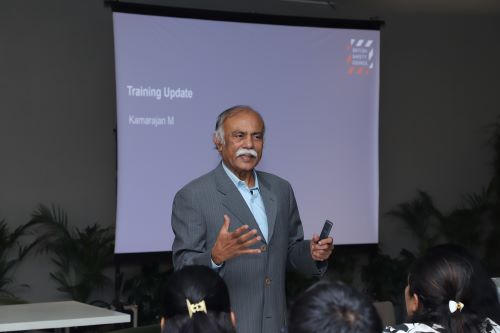Indian companies are increasingly supporting the mental wellbeing of staff through initiatives like days off for recuperation, counselling and mobile apps designed to build resilience to stress.
Features
Help is at hand
An inevitable long-term impact of the Covid-19 pandemic has been an increase in employees reporting mental health problems. All the statistics show a spike in reports of poor mental health in India. For many people, work has been part of the problem, due to increased demands, tight deadlines, professional burnout, financial distress, heightened social isolation and a skewed work-life balance.
In 2020, two migrant workers, Rambabu and Chutku, from Banda village in Uttar Pradesh, killed themselves due to financial distress caused by being out of work. In another incident, two brothers, Arpit (42) and Ankit (47) were found hanging in their jewellery shop in Delhi, leaving behind a suicide note stating the financial crisis had driven them to end their lives.
A mental health survey conducted in 2015-16 by the National Institute of Mental Health and Neuro-Sciences (NIMHANS) found that about 150 million Indians required mental health care interventions but less than 30 million were seeking assistance. Clearly, the unrelenting pandemic will have fast-tracked the mental health time bomb in India.
 Photograph: iStock; credit Deepak Sethi
Photograph: iStock; credit Deepak Sethi
According to a study published in a peer-reviewed journal, Plos One, in August 2021, the pandemic has altered the routine of life and caused unanticipated changes globally, leading to severe psychological responses and a mental health crisis. And India is no exception to this problem.
Online and telephone-based counselling to be launched
In her Budget speech in February, finance minister Nirmala Sitharaman noted that the pandemic had led to an increase in mental health problems among people across different age groups. As a remedy for this, she announced the setting up of 23 ‘tele-mental health centres’ in the country, with NIMHANS acting as the ‘nodal’ or coordinating centre.
Sitharaman said the health centres will “provide better access to quality mental health counselling and care services”, and the move is expected to lead to the launch of online and telephone-based counselling for people on how to improve their mental wellbeing.
The finance minister’s announcement of better mental health support for the population comes as India businesses are increasingly seeking to support the mental wellbeing of their workforce.
Businesses have begun to realise that supporting employee mental health is crucial for both the success of the organisation and the productivity and performance of its workers.
To support the mental wellbeing of staff, Indian companies are adopting new measures, such as music therapy classes, mindfulness exercises, ‘healing’ days off, ‘switch-off’ days and emotionally intelligent chatbots.
They are also conducting ‘pulse’ surveys to understand employee sentiment around issues like work-related stress and mental health problems in general, training managers to spot the signs of poor mental health and support workers who are experiencing mental health difficulties, and appointing mental wellbeing ambassadors who staff can approach for help and advice.
According to the employee benefits and health insurance technology platform Pazcare’s India’s Health and Wellness at Work report on employee benefits and healthcare, 62 per cent of Indian companies now provide internal employee wellness programmes – with half of these being provided by the software industry. However, the report found only 35 per cent of Indian start-up companies provide their employees with wellbeing sessions and workshops.
Global software giant Adobe India recently boosted its human resources initiatives and practices to help staff cope better with work-related stress, pressures outside work and general difficulties with their mental health. It has introduced a ‘time-off’ benefit for employees directly impacted by Covid-19, either because they are ill, caring for a family member who is ill or have to take care of a child or an older relative. In addition, Adobe offers two paid week-long company holidays each year, one in summer and one in winter.
Abdul Jaleel, vice president of employee experience at Adobe India, said the emotional and mental wellbeing of staff is a prime focus for the organisation, alongside workers’ physical wellbeing. Adobe’s employee assistance programme offers all staff 24/7 access to confidential counselling, and workers have free access to meditation, good sleep and general wellbeing apps like Headspace and LifeDojo.
Jaleel says supporting the health and wellbeing of its employees is a core focus for Adobe India, which employs around 7,000 people, making India the second largest country division after the USA business. “These values are core to our work culture,” he says. “We are committed to creating an exceptional experience for our employees which helps them grow professionally as well as personally.”
Wellness day leave
Biopharmaceuticals giant Pfizer also believes a healthy workforce is an asset and has introduced wellness initiatives to encourage employees to strive for holistic mental and physical wellbeing.
“Towards this, colleagues can avail of a slew of options such as Wellness Day Leave, partake in the corporate immunisation programme, and also access wellbeing tips and ideas from Thrive – a leading global behaviour change company,” says Shilpi Singh, director of people experience at Pfizer Ltd in India.
Also, Indian companies such as Johnson & Johnson, ITC, Microsoft, Tech Mahindra, Cisco, EY, L’Oréal, Byju’s, Accenture, Hinduja, Mphasis, Publicis Sapient and Godrej Housing Finance have been rolling out new employee wellbeing initiatives as well as strengthening those launched earlier.
Tech Mahindra says its ‘Mind Plan’, a mental health initiative that provides daily doses of mindful tips and exercises to employees, “will help associates [workers] relax and feel positive during challenging times”. Harshvendra Soin, global chief people officer at Tech Mahindra, said the company has also assigned employees as ‘wellness warriors’.
LUXASIA, one of the largest distributors of luxury beauty products in the Asia Pacific region, recently announced an annual one-day mental health leave benefit for employees.
The idea is to destigmatise mental health issues at work – therefore encouraging workers to disclose any difficulties they may be facing – and provide employees with an opportunity for self-care during a day’s absence from work.
Almost 2,000 people who work full-time for LUXASIA across 15 markets in the Asia Pacific region are set to benefit from this new policy, including those in Singapore, Malaysia, Indonesia, Greater China and India.
Chan Wing Git, the company’s group head of talent and excitement, said: “At some point, we had considered generically naming it ‘wellbeing leave’. Eventually, we felt that it was important to emphasise and destigmatise mental health issues.
“Moving forward, LUXASIA will continue strengthening mental wellbeing support through meaningful initiatives such as sponsored counselling sessions and wellness workshops.”
In September 2021, social e-commerce platform Meesho announced a company-wide break from 4–14 November so its employees could completely switch off from work. The break is designed to prioritise employee wellbeing and mental health support and is the first move of its kind from an Indian start-up.
“In these difficult times, understanding your employees and being empathetic is extremely crucial for any new-age organisation,” said Ashish Kumar Singh, chief HR officer at Meesho.
Meanwhile, Microsoft India renamed its sick leave as ‘sick and mental health leave’ and saw a major increase in the number of employees taking the leave. Also, the InMobi marketing platform rolled out 21 days of ‘no-questions-asked’ leave which employees can make use of anytime during the year to just switch off and recoup.
Sidhharrth S Kumaar, a personalised wellness coach and founder of the NumroVani holistic care service, said: “It is time for employers to incentivise a healthy lifestyle where one [employee] is able to take care of their physical, emotional, social and spiritual wellbeing.”
Kumaar added that employees who participate in wellness initiatives are less likely to develop health problems, and these programmes help people to focus and be more effective at work.
Virtual therapy sessions
Meanwhile, Mayank Kale, CEO & co-founder of employee health benefits and health insurance provider Loop Health, argues that the government’s new national tele-mental health programme will kick-start a trend where more companies offer virtual therapy sessions to help employees manage their emotions and feelings of stress.
“We will see an increase in businesses collaborating with other enterprises or start-ups in the mental wellness space that provide mental health support online and anonymously or [businesses will] hire a full-time therapist to provide one-to-one sessions to employees in need,” he said.
This is a trend that appears to have already begun, with Microsoft India partnering with Happify to provide employees with access to fun, individualised and science-based activities and games to reduce stress, deal with anxiety and improve resilience. Also, the healthcare technology provider Genpact offers a series of webinars – from music therapy and art to sessions on parenting through the pandemic – to help employees cope with anxiety and stress.
Maneesh Menda, head of HR at NatWest Group in India, says the use of online mental health support and apps will continue to grow: “Colleagues are increasingly exploring wellbeing initiatives that include using health apps and participating in rehab programmes and other webinars,” he said.
NatWest has also introduced a number of other initiatives to support worker wellbeing, such as the expansion of flexible working, an enhanced focus on ensuring employees take their full allocation of leave days and an increased promotion to staff of the availability of its 24/7 employee assistance programme.
Meanwhile, in June 2020, the Insurance Regulatory and Development Authority of India (IRDAI) issued a circular instructing insurance providers to include mental illnesses under the scope of employee health insurance cover. However, despite this, only a few private insurers include insurance cover for mental health issues in the employee insurance policies that workers can take out or be provided with by their company.
However, there are some notable exceptions to this. For instance, ICICI Lombard’s flagship product – Complete Health Insurance Product – provides financial cover for medical costs in the event of an employee being hospitalised for all declared and accepted mental health problems.
Also, HDFC Ergo ‘s ‘My Health Suraksha’ insurance cover, and health insurance policies from Max Bupa and Manipal Cigna, cover the cost of medical care for mental illnesses, should it be required for the insured worker.


FEATURES

Long working hours in India: debate rages over the impact on wellbeing
By Orchie Bandyopadhyay on 10 March 2025
Calls from high profile leaders of both Indian and global information technology companies for Indian and international workers to work longer hours to boost economic output and speed up the development of AI technology have led to warnings about the threat to workers’ health and work-life balance.

Safety training: top tips for improving its effectiveness
By Marimuthu Kamarajan on 10 March 2025
Health and safety training is a vital tool for improving the safety performance of a business. However, employers must first address any cultural problems that could undermine its effectiveness, such as time pressures encouraging workers to take short-cuts, explains Marimuthu Kamarajan, head of education at British Safety Council.

